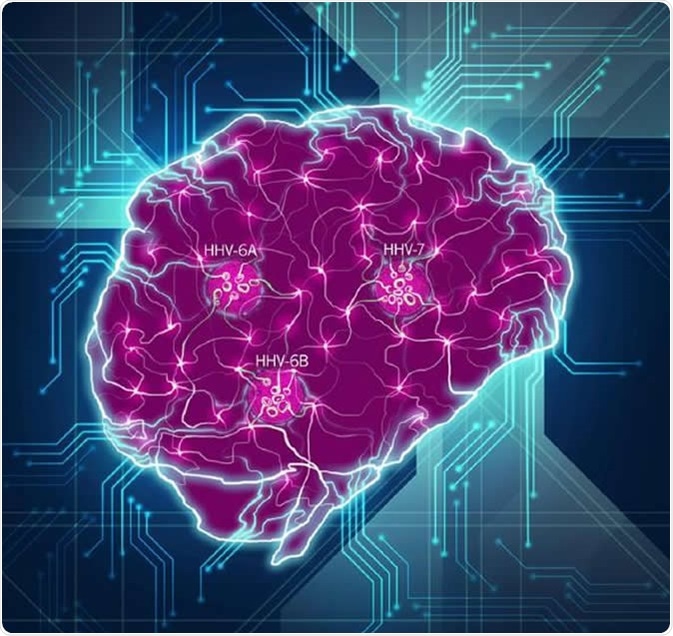Alzheimer’s disease (AD) is a neurodegenerative disease that progresses over time and autopsies show that hallmarks of the disease include pathological changes to patients’ brain structures, such as neurofibrillary tangles (NFTs) and amyloid deposition. However, the literature is in disagreement whether or not these proteinaceous changes to the brain are actually linked to the etiology of the disease.
There has been a growing interest in the potential role of infectious agents in AD, and one that is of particular interest to the field is Herpes simplex virus type 1 (HSV1). In combination with apolipoprotein E (apoE)‐ε4 allele, the existence of HSV1 in the brain increasing the risk of AD dramatically. More recent research by W.R Lin, has found that herpesvirues HHV6 ( type B) may also increase the risk of AD as they found that HHV6 was present in a significantly higher proportion of brains of older people who had clinical symptoms of AD than their non-diseased peers.

The brain is shown here as a complex network of interactions, with disruption of connections by the key viral species (HHV-6A, HHV-6B, HHV-7) identified in this study. Image Credit: Readhead et al.
Mechanism of Action
HSV1 virus is latent in the brains of many older people but may reactivate under conditions of stress, peripheral infection and immunosuppression. In APOE-e4 carriers, viral damage occurs to a greater extent. Reactivation of the virus causes both direct cellular damage to the brain and inflammatory damage. This is linked to the formation of beta-amyloid (Aβ) as well as AD-like tau protein (P-tau) that is seen in cell cultures infected with HSV1. HSV1 DNA is also found within amyloid plaques that are characteristic of AD. HSV1 interacts with amyloid precursor protein (APP) and they both subsequently localize and travel together within the same cell. Infection with HSV1 also induces the expression of toll-like receptors (TLR). Adults infected with HSV1 show an increased incidence of cognitive decline.
Immunologic Evidence
Again, the presence of anti-HSV1 IgM antibodies suggestive of recent reactivation in elderly people is predictive of the occurrence of dementia within 14 years compared to IgG positivity alone, suggesting that it is viral reactivation that eventually results in dementia. High levels of these IgM antibodies are also accompanied by low circulating Aβ1-40 and 1-42, which is considered a sign that the reduction in plasma reflects accumulation within the brain, though some researchers consider that the reactivation is caused by such an accumulation rather than being its result. In short, the presence of IgM antibodies against HSV1 is associated with a twofold risk of AD.
It is hypothesized that each reactivation of the virus produces a small increase in local brain damage due to the newly generated viruses, the resulting inflammation of the neurons and increase in tau phosphorylation reflect a marker of degenerative brain disease. The new virus particles markedly alter several neuronal processes such as anterograde transport and cell membrane integrity, which are crucial for neuronal survival, especially when the infection is chronic.
Does Herpesvirus Cause Alzheimer's?
Genetic Studies
Genome wide association studies (GWAS) suggest that herpes viruses may be responsible for various single nucleotide polymorphisms (SNPs) which in combination increase the risk of AD. These may affect the risk of reactivation in different ways, such as influencing the transport of virus to the brain, neuronal entry of viruses, dysregulation of immune defenses, preventing early apoptosis of the infected cells or making cells more vulnerable to infection. This is more probable in that HSV1 can bind to several cell proteins and regulate their expression.
Most herpesvirus infections involving the brain in subjects over 60 are due to HSV1, and almost all are in females, an interesting finding since AD is far more common in elderly women. More support is gained from the repeated findings of lower amyloid and tau protein accumulation in Vero cell cultures infected with HSV1 when treated with antivirals such as acyclovir and intravenous immunoglobulin.
Conclusions
There is a growing body of evidence that the missing link in the etiology of AD in the elderly is reactivation of HSV1 latent in the human brain. The newly produced virions interfere with several vital neuronal functions, leading to progressive neurodegeneration and eventually to significant cognitive losses. Since indirect cell or animal studies have not yielded unequivocal evidence, it is difficult to provide absolute proof in the absence of any direct in vivo experimentation, which would be highly unethical. Following more evidence and understanding of the link between HSV1 and AD, possible implications for treatments or prevention of AD could be a vaccination against HSV1 or timely antiviral treatment. The first would practically be difficult to carry out, given that HSV1 is an ubiquitous infection and its prevention would require immunization almost at birth, with follow up proceeding for more than 60 or 70 years afterwards. The second option remains to be tested clinically.
Further Reading